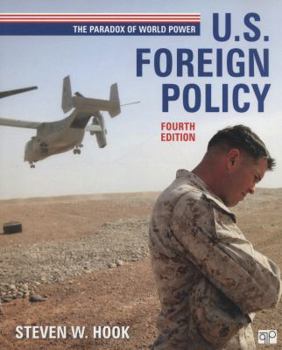U.S. Foreign Policy: The Paradox of World Power
Select Format
Select Condition 
Book Overview
The United States faces growing challenges to its primacy in the global balance of power. The very factors that have given rise to its dominance--a sense of exceptionalism, the sharing and fragmentation of political power, and the engagement of civil society in the foreign policy process--also create vulnerabilities for the country. Fast-moving developments overseas, meanwhile, won′t wait for U.S. leaders to adopt perfect foreign policy strategies. The fourth edition of Steven W. Hook′s U.S. Foreign Policy: The Paradox of World Power provides students with a concise and accessible overview of this foreign policy paradox, and highlights the challenges facing policy makers. Instructors and students will appreciate the book′s new full-color interior, expanded graphics program with new and thoroughly updated tables, figures, maps and feature boxes, and end-of-chapter resources for further review and study.
Format:Paperback
Language:English
ISBN:1452241503
ISBN13:9781452241500
Release Date:May 2013
Publisher:CQ Press
Length:544 Pages
Weight:1.85 lbs.
Dimensions:0.7" x 7.0" x 9.0"
Customer Reviews
2 ratings
Is the paradox of power unidimensional?
Published by Thriftbooks.com User , 16 years ago
Steven Hook's well written book on the US foreign policy is purposeful and incisive. He has dwelt on the historical perspective in a skillful manner while astutely pointing to the contemporary problems engulfing that country, at the same time. He is right in affirming that increasing openness and democratization on a global scale has injected diverse views and varied interests of so many nations that cross those of the United States. As a result, United States' policy makers are ever on the hunt for that elusive answer that would knit every other nation to Americanization. Instead, America is beset with near insurmountable problems at home and abraod. In fact, the United States is running short of ideas and seem to have been approaching a dead end since most of the available options has been exhausted. My book, "Tracing the Eagle's Orbit", provides a concrete answer as to how the problems posed by Dr. Hook can be solved, with a particular reference and anlyses to a chapter on Politics of Domination. Dr. Hook's book is very interesting and the readers would be glad to read it from start to finish. Gautam Maitra Author of 'Tracing the Eagle's Orbit: Illuminating Insights into Major US Foreign Policies Since Independence.'
A refreshing guide to U.S foreign policy
Published by Thriftbooks.com User , 18 years ago
This detailed and enlightening overview of the U.S. power and hegemony in the modern world is supported by strong historical analysis and a list of the key problems facing the nation today. Professor Steven W. Hook outlines three major threats to U.S. Primacy, the first being cycles in the balance of power, concerns over economic globalization and the immediate threat of international terrorism (asymmetric warfare). Beginning with a historical overview, the American notion of "isolationism" is challenged by the westward expansion and influence in the Americas. Furthermore, we are given a fresh perspective on the Cold War and theories of International Relations. Professor Hook approaches this study largely from a liberalist perspective and stresses the importance of understanding the multiple facets within the "black box" of foreign policymaking. The complexity of this process is illustrated by the numerous actors involved in webs of issues networks and organizations representing a myriad of interests. Steven Hook's writing is consistently interesting from topic to topic and the issues well developed and strategically organized, which discourages fragmented or selective reading of just one chapter. I would encourage this for a collegiate or AP audience with knowledge of basic American Government and political process. Reading, however, is not excessively jargonistic and is presented logically with the terminology explained. I would recommend this to anybody inquisitive who wishes to learn more about America's important place in the world today.






